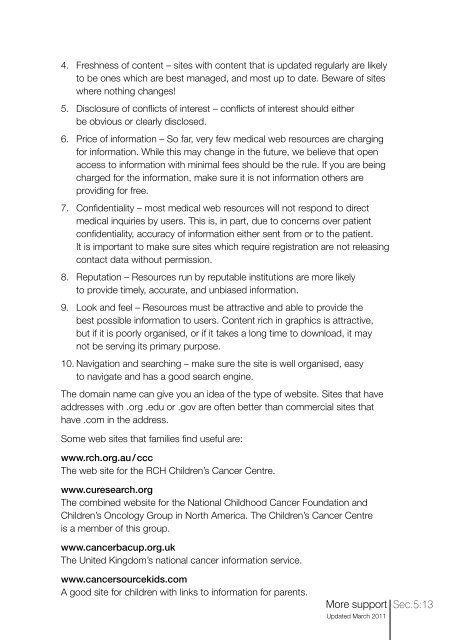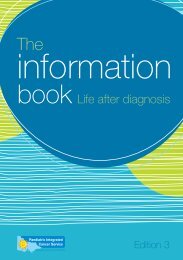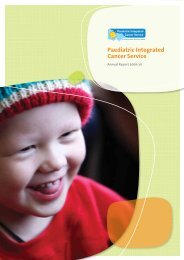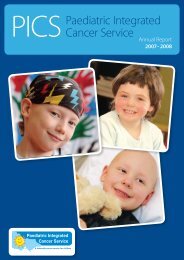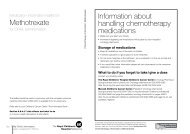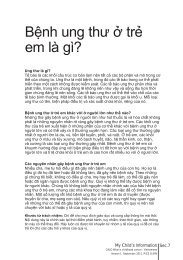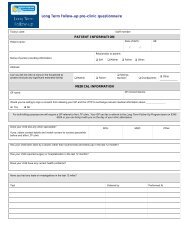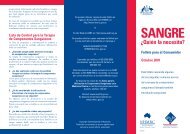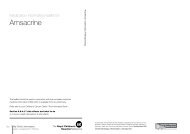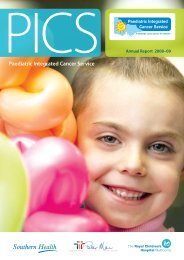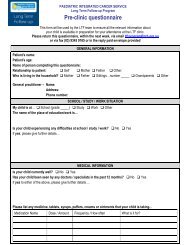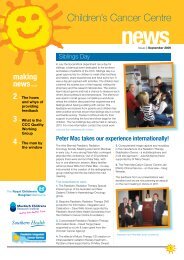The information book - Paediatric Integrated Cancer Service
The information book - Paediatric Integrated Cancer Service
The information book - Paediatric Integrated Cancer Service
You also want an ePaper? Increase the reach of your titles
YUMPU automatically turns print PDFs into web optimized ePapers that Google loves.
4. Freshness of content – sites with content that is updated regularly are likely<br />
to be ones which are best managed, and most up to date. Beware of sites<br />
where nothing changes!<br />
5. Disclosure of conflicts of interest – conflicts of interest should either<br />
be obvious or clearly disclosed.<br />
6. Price of <strong>information</strong> – So far, very few medical web resources are charging<br />
for <strong>information</strong>. While this may change in the future, we believe that open<br />
access to <strong>information</strong> with minimal fees should be the rule. If you are being<br />
charged for the <strong>information</strong>, make sure it is not <strong>information</strong> others are<br />
providing for free.<br />
7. Confidentiality – most medical web resources will not respond to direct<br />
medical inquiries by users. This is, in part, due to concerns over patient<br />
confidentiality, accuracy of <strong>information</strong> either sent from or to the patient.<br />
It is important to make sure sites which require registration are not releasing<br />
contact data without permission.<br />
8. Reputation – Resources run by reputable institutions are more likely<br />
to provide timely, accurate, and unbiased <strong>information</strong>.<br />
9. Look and feel – Resources must be attractive and able to provide the<br />
best possible <strong>information</strong> to users. Content rich in graphics is attractive,<br />
but if it is poorly organised, or if it takes a long time to download, it may<br />
not be serving its primary purpose.<br />
10. Navigation and searching – make sure the site is well organised, easy<br />
to navigate and has a good search engine.<br />
<strong>The</strong> domain name can give you an idea of the type of website. Sites that have<br />
addresses with .org .edu or .gov are often better than commercial sites that<br />
have .com in the address.<br />
Some web sites that families find useful are:<br />
www.rch.org.au / ccc<br />
<strong>The</strong> web site for the RCH Children’s <strong>Cancer</strong> Centre.<br />
www.curesearch.org<br />
<strong>The</strong> combined website for the National Childhood <strong>Cancer</strong> Foundation and<br />
Children’s Oncology Group in North America. <strong>The</strong> Children’s <strong>Cancer</strong> Centre<br />
is a member of this group.<br />
www.cancerbacup.org.uk<br />
<strong>The</strong> United Kingdom’s national cancer <strong>information</strong> service.<br />
www.cancersourcekids.com<br />
A good site for children with links to <strong>information</strong> for parents.<br />
More support Sec.5:13<br />
Updated March 2011


